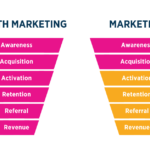
¿Te Están Dando Gato por Liebre? Descubre si Tu Agencia de Marketing te Entrega los Números Correctos
junio 9, 2024
Agencia de marketing Tijuana
julio 3, 2024Understanding the Car Rental Market: Size, Trends, and Growth Strategies
The car rental market has seen substantial growth over the past decade, driven by changing consumer preferences, advancements in technology, and increased travel. This blog will explore the current state of the car rental market, its size, key trends, and present a set of recommendations that a leading growth marketing agency might suggest to boost business in this competitive industry.
The Car Rental Market: An Overview
The car rental market is a significant segment of the travel and transportation industry, providing vehicles for short-term use, ranging from a few hours to several weeks. Major players in this market include well-known brands such as Enterprise, Hertz, Avis, and Budget, as well as numerous local and regional operators.
Market Size and Growth
As of 2023, the global car rental market was valued at approximately $103 billion. This market is projected to grow at a compound annual growth rate (CAGR) of 6.5% from 2024 to 2030, reaching an estimated value of $160 billion by 2030. The North American market holds the largest share, followed by Europe and Asia-Pacific, with significant growth anticipated in emerging markets such as China and India.
Several factors contribute to this growth:
- Rising Tourism and Business Travel: Increased travel for both leisure and business purposes fuels demand for rental cars.
- Urbanization: Growing urban populations and the expansion of smart cities boost the need for car rentals.
- Technological Advancements: Innovations like mobile apps, automated booking systems, and electric vehicles enhance user convenience and appeal.
- Environmental Concerns: A shift towards eco-friendly travel options, including electric and hybrid rental cars, aligns with growing environmental consciousness.
- Ride-Sharing Trends: While ride-sharing services present competition, they also create opportunities for partnerships and diversified service offerings.

Key Trends in the Car Rental Market
1. Technological Integration
Technology plays a crucial role in shaping the car rental industry. The adoption of advanced technologies such as artificial intelligence (AI), Internet of Things (IoT), and blockchain is transforming operations, from fleet management to customer service. Mobile apps have become essential tools, enabling customers to book, unlock, and return vehicles seamlessly.
2. Sustainability Initiatives
There is a growing emphasis on sustainability within the car rental industry. Companies are increasingly incorporating electric and hybrid vehicles into their fleets to reduce carbon footprints. Initiatives such as carbon offset programs and the promotion of green travel options resonate with environmentally conscious consumers.
3. Flexible Rental Options
The demand for flexible rental options, including short-term rentals, long-term leases, and subscription-based models, is on the rise. Customers seek convenience and affordability, prompting companies to diversify their offerings to meet these needs.
4. Enhanced Customer Experience
Providing an exceptional customer experience is paramount. Car rental companies are investing in personalized services, loyalty programs, and improved customer support to differentiate themselves in a crowded market. Utilizing data analytics to understand customer preferences and behavior helps in crafting tailored experiences.
Recommendations for Growth
To capitalize on the expanding car rental market, a leading growth marketing agency would focus on the following strategic recommendations:
1. Leverage Data Analytics
Data-driven decision-making is essential for growth. By leveraging data analytics, car rental companies can gain insights into customer preferences, usage patterns, and market trends. This information can inform targeted marketing campaigns, optimize fleet management, and enhance customer satisfaction.
- Action Point: Implement robust data analytics tools to gather and analyze customer data, and use these insights to tailor marketing strategies and improve operational efficiency.
2. Expand Digital Presence
A strong digital presence is crucial in today’s market. Enhancing online visibility through search engine optimization (SEO), pay-per-click (PPC) advertising, and social media marketing can drive traffic and increase bookings. Developing a user-friendly website and mobile app is also vital for seamless customer interactions.
- Action Point: Invest in SEO and PPC campaigns, and enhance the functionality of your website and mobile app to ensure a smooth user experience.
3. Focus on Sustainability
Sustainability is a key differentiator in the car rental market. By expanding the fleet with electric and hybrid vehicles, car rental companies can appeal to eco-conscious customers. Promoting green travel options and implementing sustainable business practices will enhance brand reputation and attract a broader customer base.
- Action Point: Increase the proportion of electric and hybrid vehicles in the fleet, and market these options prominently to environmentally conscious consumers.
4. Enhance Customer Experience
Exceptional customer service can set a car rental company apart from its competitors. Implementing personalized services, loyalty programs, and efficient customer support channels can foster customer loyalty and drive repeat business. Utilizing customer feedback to continuously improve services is also crucial.
- Action Point: Develop and promote a loyalty program, and invest in training customer support staff to provide personalized and efficient service.
5. Adopt Flexible Rental Models
Offering a variety of rental options, such as short-term, long-term, and subscription-based models, can cater to diverse customer needs. Flexibility in rental periods and pricing structures can attract different segments of the market, from tourists to corporate clients.
- Action Point: Introduce flexible rental packages and subscription models, and market these options to different customer segments.
6. Form Strategic Partnerships
Collaborating with travel agencies, airlines, hotels, and ride-sharing services can expand the reach and customer base of a car rental company. Strategic partnerships can provide additional marketing channels and create bundled offers that enhance value for customers.
- Action Point: Identify potential partners and develop joint marketing campaigns or bundled service packages to attract new customers.
7. Invest in Technology
Continuous investment in technology is essential to stay competitive. Adopting AI for predictive maintenance, IoT for real-time tracking, and blockchain for secure transactions can improve operational efficiency and customer satisfaction.
- Action Point: Allocate resources for the integration of advanced technologies that streamline operations and enhance the customer experience.
Conclusion
The car rental market is poised for significant growth, driven by technological advancements, sustainability initiatives, and changing consumer preferences. By leveraging data analytics, expanding digital presence, focusing on sustainability, enhancing customer experience, adopting flexible rental models, forming strategic partnerships, and investing in technology, car rental companies can position themselves for success in this dynamic industry.
For a leading growth marketing agency, these recommendations provide a roadmap to help car rental companies navigate the competitive landscape and achieve sustained growth. By staying attuned to market trends and continuously innovating, car rental businesses can capitalize on emerging opportunities and meet the evolving needs of their customers.




